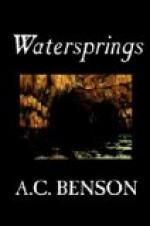He settled down to look over a set of compositions. But he was in a somewhat restless frame of mind to-night, and a not unpleasant mood of reflection and retrospect came over him. What an easy, full, lively existence his was! He seemed to himself to be perfectly contented. He remembered how he, the only son of rather elderly parents, had gone through Winchester with mild credit. He had never had any difficulties to contend with, he thought. He had been popular, not distinguished at anything—a fair athlete, a fair scholar, arousing no jealousies or enmities. He had been naturally temperate and self-restrained. He had drifted on to Beaufort as a Scholar, and it had been the same thing over again—no ambitions, no failures, friends in abundance. Then his father had died, and it had been so natural for him, on being elected to a Fellowship, just to carry on the same life; he had to settle to work at once, as his mother was not well off and much invalided. She had not long survived his father. He had taught, taken pupils, made a fair income. He had had no break of travel, no touch with the world; a few foreign tours in the company of an old friend had given him nothing but an emotional tincture of recollections and associations—a touch of varnish, so to speak. Suddenly the remembrance of some of the things which Jack Sandys had said that morning came back to him; “real things” the boy had said, so lightly and yet so decisively. He wondered; had he himself ever had any touch with realities at all? He had been touched by no adversity or tragedy, he had been devastated by no disappointed ambitions, shattered by no emotions. His whole life had been perfectly under his control, and he had grown into a sort of contempt for all unbalanced people, who were run away with by their instincts or passions. It had been a very comfortable, sheltered, happy life; he was sure of that; he had enjoyed his work, his relations with others, his friendships; but had he ever come near to any fulness of living at all? Was it not, when all was said and done, a very empty affair—void of experience, guarded from suffering? “Suffering?” he hardly knew the meaning of the word. Had he ever felt or suffered or rebelled? Yes, there was one little thing. He had had a small ambition once; he had studied comparative religion very carefully at one time to illustrate some lectures, and a great idea had flashed across him. It was a big, a fruitful thought; he had surveyed that strange province of human emotion, the deepest strain of which seemed to be a disgust for mingling with life, a loathing of bodily processes and instincts, which drove its votaries to a deliberate sexlessness, and set them at variance with the whole solid force of Nature, the treacherous and alluring devices by which she drove men to reproduction with an insatiable appetite; that mystical strain, which appeared at all times and in all places, a spiritual rebellion against material bondage, was not that the desperate cry of the fettered spirit? The conception of sin, by which Nature traversed her own activities and made them void—there was a great secret hidden here. He had determined to follow this up, and to disguise with characteristic caution and courtesy a daring speculation under the cloak of orthodox research.




